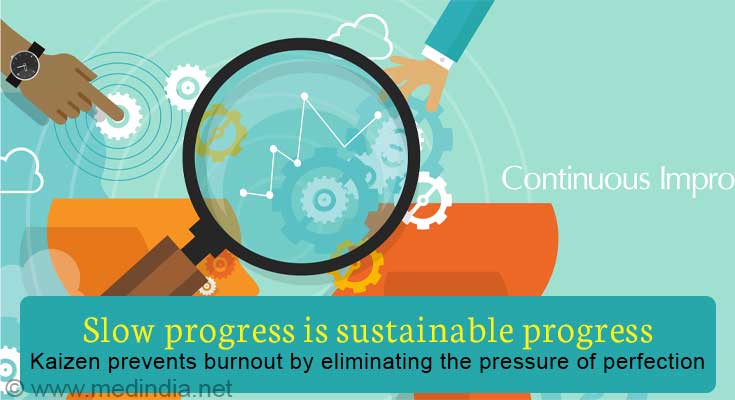Discover how the Kaizen technique uses small, steady changes to enhance mental health, reduce stress, and boost emotional resilience.
- Kaizen reduces stress by breaking big tasks into smaller, manageable steps
- Promotes sustainable habits that support long-term mental well-being
- Builds emotional resilience and boosts motivation with tiny, consistent changes
Kaizen means "continuous improvement" in Japanese and focuses on small, daily changes for long-term success. #mentalhealth #medindia’
What Is the Kaizen Technique?
Kaizen is a Japanese term that means “continuous improvement.” Initially developed for businesses to enhance productivity and efficiency, it has found its way into personal development and mental health practices. The philosophy revolves around making small, incremental changes rather than attempting drastic transformations. These small changes, when practiced consistently, can lead to significant improvements in one’s life (1✔ ✔Trusted SourceA Practical Guide to the Kaizen Approach as a Quality Improvement Tool
Go to source).
The strength of Kaizen lies in its simplicity: instead of overwhelming yourself with big goals, you take manageable steps each day, making progress feel achievable.
How the Kaizen Technique Supports Mental Well-Being
According to a Fitness Coach, Kaizen aligns well with how our brains process change. This makes it an excellent tool for improving mental health.Reduces Overwhelm
Large tasks often feel intimidating. Kaizen reduces this stress by breaking down goals into smaller, achievable steps, making the process feel less daunting.
Builds Sustainable Habits
Gradual progress fosters long-term habits that support mental well-being. Since the changes are small, they are easier to maintain.

Increases Motivation
Studies show that dividing tasks into smaller actions can boost motivation by up to 80%. This makes starting and completing tasks less stressful.
Nurtures Emotional Resilience
When you feel stuck, ask, “What’s the smallest step I can take today?” shifts your focus from the problem to the solution. This simple mindset shift helps reduce stress and encourages positive thinking (2✔ ✔Trusted Source
Lean Thinking and Methods - Kaizen
Go to source).
Kaizen and Stress Management
Stress management is crucial for maintaining mental health. The Kaizen method simplifies this process by promoting efficient work habits and removing unnecessary stressors. Here’s how Kaizen helps in managing stress:Eliminates Waste
By cutting out unnecessary tasks, Kaizen saves time and energy, leading to a sense of control and reduced frustration.
Encourages Collaboration
Kaizen promotes teamwork and open communication. This reduces feelings of isolation, providing a support system that helps manage stress.
Builds Resilience
Focusing on small successes reduces the pressure to be perfect. This mindset boosts motivation and helps you overcome obstacles with confidence.
Improves Efficiency
Streamlining tasks through Kaizen leads to better results with less effort, preventing burnout and promoting a healthier work-life balance.
Practical Ways to Apply Kaizen for Mental Well-Being
Applying Kaizen to your daily routine doesn’t have to be complicated. Here are simple yet effective ways to use this technique:- Set Tiny Goals: Instead of planning to meditate for an hour, start with 5 minutes daily.
- Daily Reflection: At the end of each day, reflect on what you did well and identify one small improvement for tomorrow.
- Break Tasks into Micro-Steps: If you’re overwhelmed by a big project, divide it into tiny, manageable tasks.
- Celebrate Small Wins: Acknowledge every small step you complete. It builds confidence and keeps you motivated.
- Ask Empowering Questions: Questions like “What’s the next small thing I can do?” help shift your mindset from anxiety to action.
Tips for Maintaining Good Mental Health
The World Health Organisation (WHO) describes mental health as a fundamental human right. Good mental health allows individuals to manage stress, develop relationships, and contribute meaningfully to society. Here are some key practices to maintain mental well-being:- Stay Connected: Regular interactions with family and friends reduce loneliness and offer emotional support.
- Be Active: Physical activity, such as walking or yoga, boosts mood and relieves stress.
- Get Enough Sleep: Aim for 7-9 hours of sleep each night. Rest is crucial for cognitive function and emotional balance.
- Practice Mindfulness: Mindfulness techniques like meditation and deep breathing promote calmness and reduce anxiety.
The key to Kaizen is understanding that the journey itself matters. Each small step you take brings you closer to a happier, healthier you. By embracing this philosophy, you unlock your potential and create a fulfilling, balanced life—one small improvement at a time.
References:
- A Practical Guide to the Kaizen Approach as a Quality Improvement Tool - (https://pmc.ncbi.nlm.nih.gov/articles/PMC10229000/)
- Lean Thinking and Methods - Kaizen - (https://www.epa.gov/sustainability/lean-thinking-and-methods-kaizen)
Source-Medindia
















